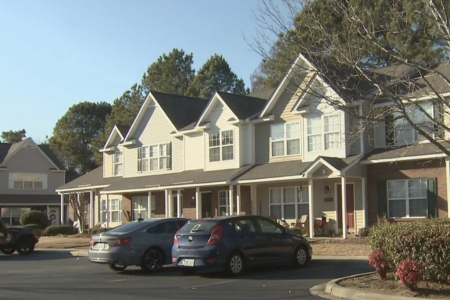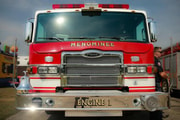These residents were unknowingly paying for someone else’s bills… Are YOU in the same boat?
- Replies 0
In the quiet, tree-lined streets of Steele Creek, Charlotte, North Carolina, a storm has been brewing, one that has left homeowners in Bennington Place I and II reeling from a shocking discovery. It's a tale of misplaced trust, financial oversight, and a $10,000 question that has every resident asking: 'Where did our money go?'
Homeowners' associations (HOAs) are meant to be the guardians of community standards and financial stewards of our shared spaces.
But what happens when those who are supposed to protect our interests end up accidentally funding a stranger's bills? This isn't just a hypothetical question for the residents of Bennington Place; it's their harsh reality.
The revelation came to light when Andrew Page, a diligent resident of Bennington Place II, joined the HOA board and took a closer look at the books.
What he allegedly found was a financial fiasco: his HOA had been erroneously paying for utilities belonging to parcels in the neighboring Bennington Place I.
“We paid somebody's water bill,” Page disclosed to WSOC-TV, a statement that barely scratches the surface of the community's outrage.
For two years, this error went unnoticed, draining the association's savings account and leaving the neighborhood $10,000 poorer. This wasn't just a minor bookkeeping blunder; it was a costly mistake that had tangible consequences for the community.
“You don’t budget for that. We weren’t thinking we needed $10,000 extra! That had come out of our savings account,"
From pothole repairs to playground maintenance, the misallocated funds could have addressed several pressing issues that now remain unresolved.
Upon discovering the error, the HOA took immediate action, contacting Charlotte Water and city council members to rectify the situation. While the billing mix-up has been corrected, the possibility of a refund remains uncertain.
Charlotte Water's policy allows for refunds of up to three years depending on the circumstances, but the utility has remained tight-lipped about this particular case, citing customer privacy.
Page's frustration is palpable as he grapples with the reality that the $10,000 may be lost forever. Despite his efforts to uncover the identity of the unintended beneficiaries and whether they were double-paying, the answers remain elusive.
For the residents of Bennington Place, the misappropriation of funds is more than just a cautionary tale; it's a call to action.
It's a reminder to be vigilant, to understand where our dues are going, and to hold our HOAs accountable.
If you're part of an HOA, take the time to review financial statements, attend meetings, and ask questions. It's your right—and your responsibility—to ensure that your community's funds are managed with the utmost care.
As for the residents of Steele Creek, their battle for reimbursement continues. They stand united, a community wronged but determined to seek justice and prevent such financial mishaps from happening again.

Have you ever experienced issues with your HOA? Do you have tips for fellow homeowners on how to stay informed and involved in HOA matters? Share your stories and advice in the comments below.
Homeowners' associations (HOAs) are meant to be the guardians of community standards and financial stewards of our shared spaces.
But what happens when those who are supposed to protect our interests end up accidentally funding a stranger's bills? This isn't just a hypothetical question for the residents of Bennington Place; it's their harsh reality.
The revelation came to light when Andrew Page, a diligent resident of Bennington Place II, joined the HOA board and took a closer look at the books.
What he allegedly found was a financial fiasco: his HOA had been erroneously paying for utilities belonging to parcels in the neighboring Bennington Place I.
“We paid somebody's water bill,” Page disclosed to WSOC-TV, a statement that barely scratches the surface of the community's outrage.
For two years, this error went unnoticed, draining the association's savings account and leaving the neighborhood $10,000 poorer. This wasn't just a minor bookkeeping blunder; it was a costly mistake that had tangible consequences for the community.
“You don’t budget for that. We weren’t thinking we needed $10,000 extra! That had come out of our savings account,"
From pothole repairs to playground maintenance, the misallocated funds could have addressed several pressing issues that now remain unresolved.
Upon discovering the error, the HOA took immediate action, contacting Charlotte Water and city council members to rectify the situation. While the billing mix-up has been corrected, the possibility of a refund remains uncertain.
Charlotte Water's policy allows for refunds of up to three years depending on the circumstances, but the utility has remained tight-lipped about this particular case, citing customer privacy.
Page's frustration is palpable as he grapples with the reality that the $10,000 may be lost forever. Despite his efforts to uncover the identity of the unintended beneficiaries and whether they were double-paying, the answers remain elusive.
For the residents of Bennington Place, the misappropriation of funds is more than just a cautionary tale; it's a call to action.
It's a reminder to be vigilant, to understand where our dues are going, and to hold our HOAs accountable.
If you're part of an HOA, take the time to review financial statements, attend meetings, and ask questions. It's your right—and your responsibility—to ensure that your community's funds are managed with the utmost care.
As for the residents of Steele Creek, their battle for reimbursement continues. They stand united, a community wronged but determined to seek justice and prevent such financial mishaps from happening again.
Key Takeaways
- Homeowners in two separate communities in Steele Creek, Charlotte, North Carolina, are demanding a $10,000 refund from their homeowner's association.
- The HOA of Bennington Place II had been unwittingly paying the bills of another property for two years, leading to a significant financial loss.
- Despite identifying and stopping the incorrect billing, it is unclear whether the HOA will be refunded by Charlotte Water, as refunds depend on the situation and are typically only issued up to three years back.
- The issue has highlighted some of the broader roles and responsibilities of homeowner's associations, as well as the potential controversies and issues that can arise from their governance of local communities.







